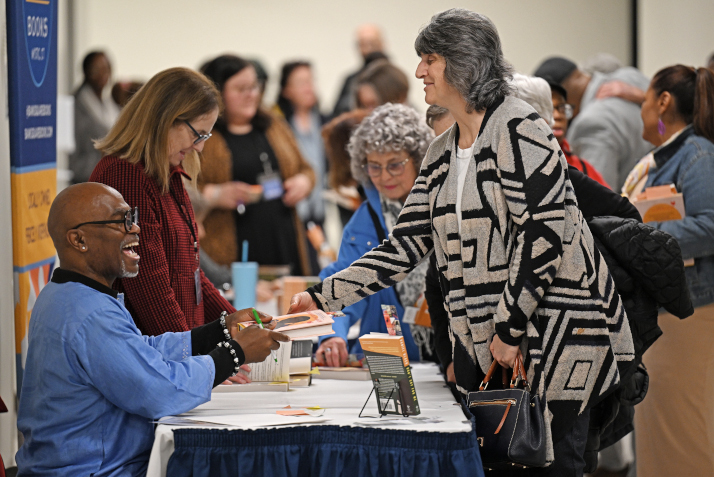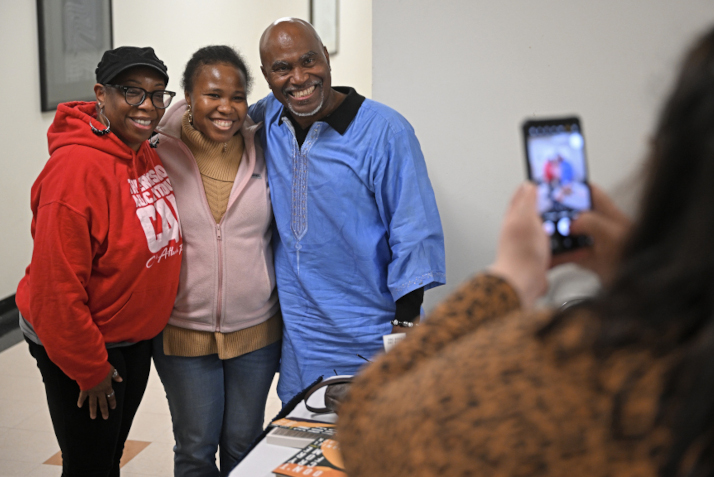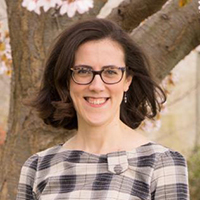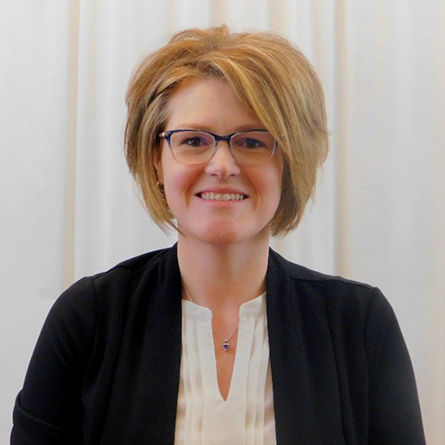
Don't Cry for Me
Connecticut College hosts author Daniel Black for One Book One Region finale event.
Daniel Black, the award-winning featured author for the 22nd annual One Book One Region program, managed for a while to stay contained in his chair at the front of Oliva Hall in Connecticut College’s Cummings Arts Center during the program’s finale event March 31. But halfway through a lively conversation with Assistant Professor of Psychology Kendell Coker about Black’s novel Don’t Cry for Me, the Clark Atlanta University professor of African American studies and English could no longer stay seated. He rose—to laughter and applause from the audience—and walked freely.
Throughout the evening, the engaged crowd of students, faculty, staff and community members laughed, applauded and murmured assent as though the magnetic Black were a preacher. In fact, before asking during the Q&A portion about the roles spirituality and the church play in African American lives today compared to the novel’s setting almost 25 years ago, one audience member said she had to stop herself from shouting, “Preach!” as Black spoke.
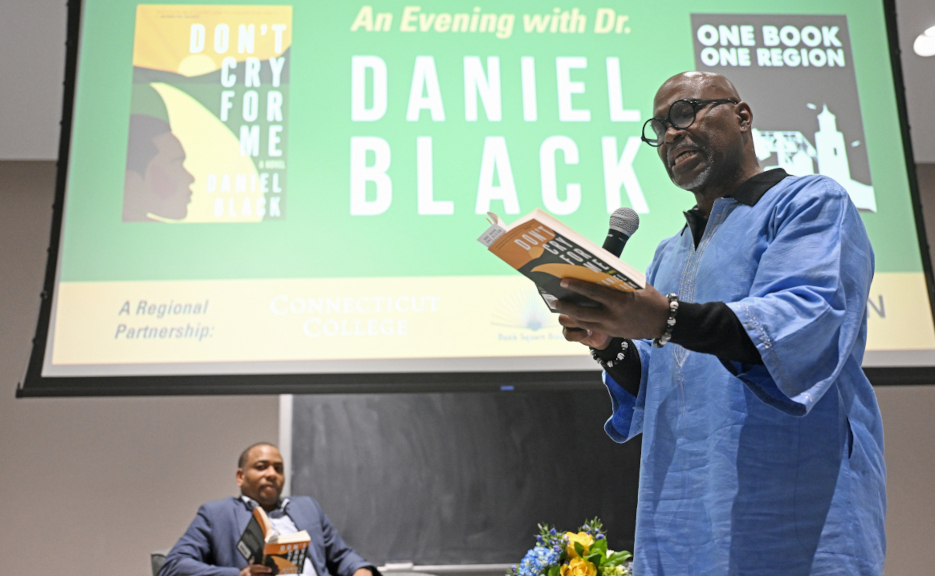
Published in 2022, Don’t Cry for Me tells the story of Jacob, an African American man who learns he is dying from cancer and attempts to make amends after many years with his estranged gay son, Isaac, through deathbed letters. Black’s fractured relationship with his own father, who received an Alzheimer’s diagnosis in 2013, inspired the novel. “For a long time, I had wanted us to hash things out …” Black wrote in his front-of-book author’s note. “And now the encounter could happen only in my imagination. So that was where I went.”
From November 2003 until his death in February 2004, Jacob writes Isaac more than 40 letters, sharing stories from his own life growing up in rural Arkansas and being raised by his grandfather, whose own father was a slave. Hoping to unravel the misunderstandings between himself and his son, Jacob describes how he understood love, masculinity and what his roles as a father and a Black man were supposed to be.
Coker, who led Monday’s discussion, is a clinical psychologist and attorney whose primary research interests include the study of trauma, substance use, juvenile delinquency and aggression/violence. His research also explores racial and health-related disparities in the criminal justice system and the contributing impact of systemic bias/discrimination.
“I want everybody to really appreciate that this is the type of book, as powerful as it is, that some people want off the shelves,” Coker said of Don’t Cry for Me. “So I read it twice, and something very powerful and unexpected happened to me when I was reading the second time: I realized I was absorbing it as a father raising a Black son.”
Black explained that was an integral part of his goal. “I wanted to write this book to see if we could plant the seeds of a kind of healing between fathers and sons, and if we could begin to announce that vulnerability is not only okay, but it's a beautiful thing for a man to share. And to be so bold to see if I can suggest that vulnerability become a requirement for what it really means to be an upstanding man.”
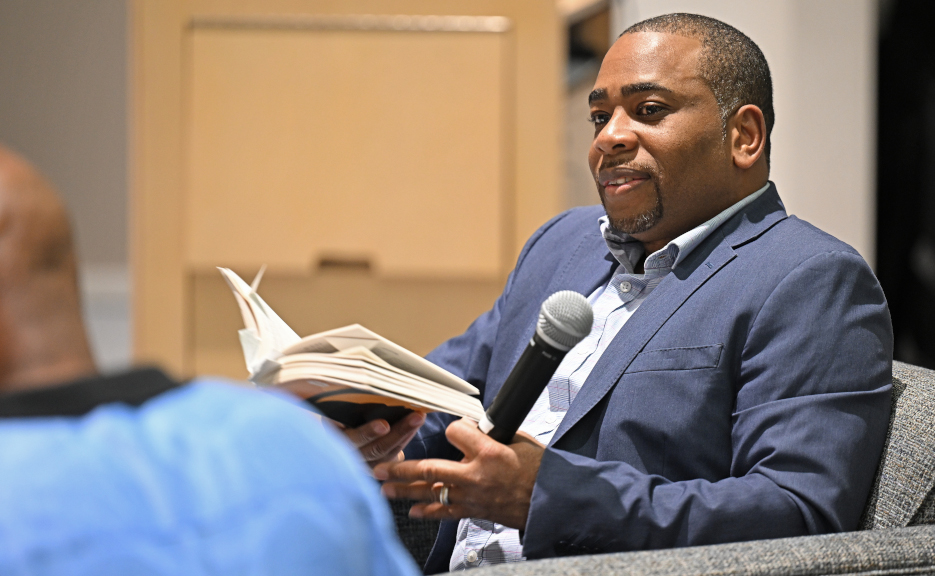
During the conversation, Black and Coker also touched upon attachment, cultural neglect, forgiveness, the impact of integration, intergenerational trauma, parenting, relationships, slavery’s reverberations and survival.
“This is the story of a man who believes he tried so hard and provided a life for his own son that's so unbelievably different from the life he had,” Black said. “And he's also troubled in his soul, because he dreamed of a son who is not the son he got. But what Jacob also begins to realize is that, as parents, you don't simply remake yourself when you have a child. We think, ‘Well, the child ought to be me or something like me, because they came from me.’ That's not true at all.
“As Khalil Gibran says, children come through you but not from you. And so, for many of us, the best thing you can do is discover who your child is and get mature enough yourself to let that child be.”
Coker asked Black a question many readers want to know: “Was Jacob forgiven?” In response, Black plugged the book’s sequel, Isaac’s Song, released in January 2025. “You will absolutely see if he’s forgiven, and the question really is, has he forgiven himself? I'm not sure Jacob believes he has the permission to forgive himself until Isaac forgives him.”
Don’t Cry for Me is Black’s seventh novel. He has also published an essay collection, Black on Black: On Our Resilience and Brilliance in America.
One Book One Region is a collaboration that began in 2002 among the libraries of eastern Connecticut to bring community members together to discuss ideas, broaden appreciation of reading and break down barriers between people.

